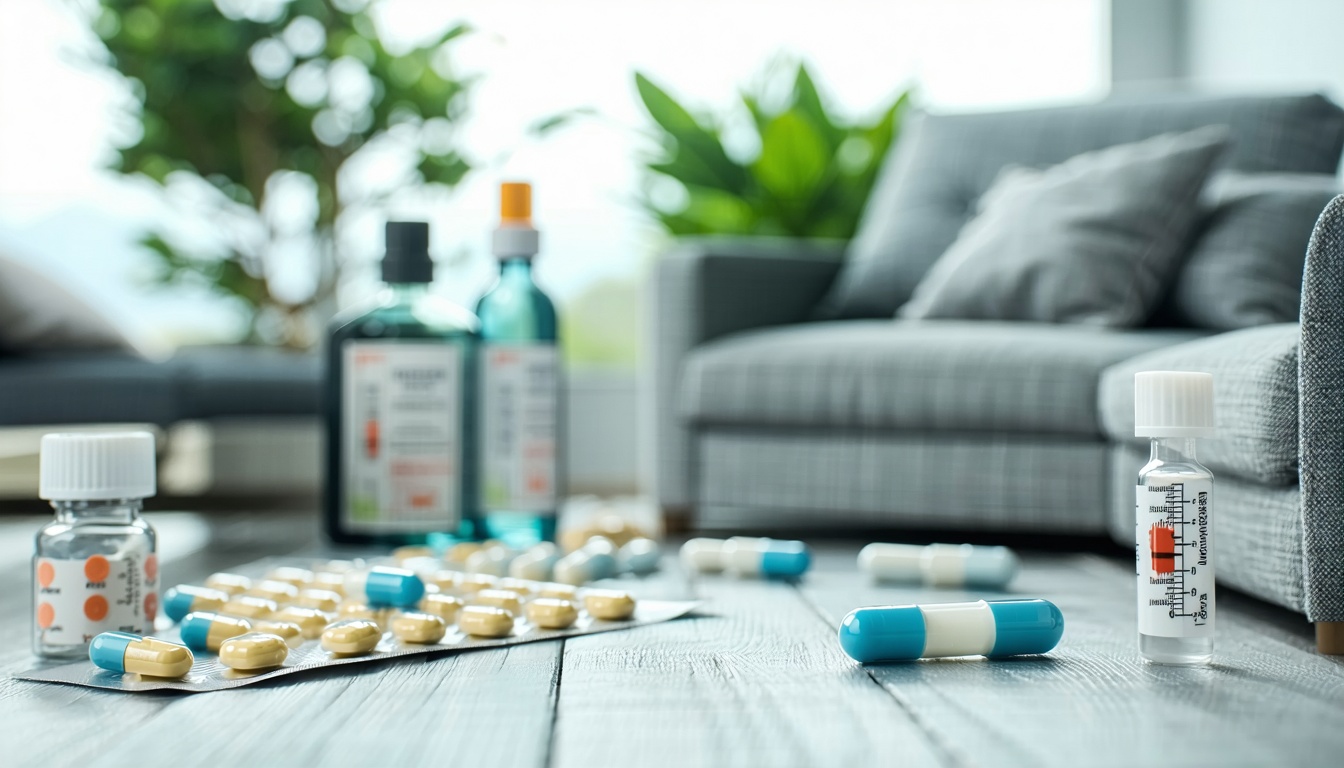Understanding Relapse
What is Relapse?
Relapse happens when someone who’s been working hard to stay clean from addiction starts using again. It’s not a failure—just a sign that more help or a different approach might be needed. It doesn’t wipe out all the progress made; it just shows that recovery is a continuous journey.
Relapse can sneak up at different times and usually falls into three stages:
- Emotional Relapse: You’re not thinking about using, but your feelings and actions are setting you up for it.
- Mental Relapse: You start daydreaming about using and planning how you might do it.
- Physical Relapse: You actually go back to using.
What Triggers Relapse?
Knowing what can trigger a relapse is key to stopping it before it starts. Triggers can be different for everyone, but some common ones are:
- Stress: When stress piles up, it can push you towards using to feel better.
- Negative Emotions: Sadness, anger, or frustration can make you crave substances to numb the pain.
- Social Pressure: Being around people who use or in places where substances are available can tempt you to join in.
- Exposure to Drugs or Alcohol: Just being near substances can be a strong trigger, especially if you haven’t built up strong defenses.
- Lack of Support: Feeling alone or unsupported can make you more likely to relapse.
Here’s a quick look at these triggers:
| Trigger | Description |
|---|---|
| Stress | Overwhelming stress can lead to using as a way to cope. |
| Negative Emotions | Emotions like sadness or anger can spark cravings. |
| Social Pressure | Being around users or in substance-filled environments. |
| Exposure to Substances | Just being near drugs or alcohol can be a trigger. |
| Lack of Support | Feeling isolated and unsupported increases the risk of relapse. |
Spotting these triggers is the first step in making a solid plan to avoid relapse. At Addiction Treatment Centers of MD, we offer personalized individual therapy for addiction and support groups for addiction to help you figure out your triggers and build strong coping skills.
Want to know more about how we can help you stay on track? Check out our addiction treatment in Maryland and our evidence-based methadone treatment centers and trauma-informed addiction treatment programs.
Staying on Track: Beating Relapse
Recovery: A Lifelong Commitment
Kicking addiction is no small feat, and staying clean is a lifelong gig. We arm folks with the right tools to dodge relapse, helping them handle cravings and triggers for the long haul. Recovery isn’t a one-and-done deal; it’s a continuous journey where treatment plays a big role in keeping you on track (New Choices Treatment Centers). At Addiction Treatment Centers of MD, we stress the need for ongoing dedication to staying sober.
Crafting Your Game Plan
Relapse doesn’t just happen out of the blue; it sneaks up on you, often starting weeks or months before you even think about using again. It creeps in emotionally, mentally, and physically. The trick is to spot the early signs and arm yourself with the skills to fight back when you’re most likely to succeed (NCBI). Here’s how we help you build a solid game plan:
- Personalized Plans: We help you draft a written, personalized plan that keeps you aware of behaviors that might lead to relapse. This plan is your roadmap to staying clean.
- Support Network: Your plan includes key contacts in your support system, so you always have someone to lean on.
- Spotting Triggers: Knowing what sets you off, both inside and out, is key. Recognizing these triggers helps you stay one step ahead.
- Coping Skills: We teach you healthy ways to handle stress and cravings, so you don’t fall back into old habits.
- Intervention Tactics: Your plan includes personalized strategies to tackle triggers head-on (VA.gov).
The American Society of Addiction Medicine lists ten must-know relapse prevention strategies for clinicians working with folks battling substance use disorders. These strategies can be mixed with other treatments and tailored to fit each person’s unique situation, considering things like their environment, motivation, severity of addiction, and any other health issues (VA.gov).
To give you the best shot at staying sober, we offer a range of services, including one-on-one therapy, methadone treatment, and support groups. Our all-in approach makes sure you get the support you need to stay clean and live your best life.
Want to know more about how we can help you avoid relapse? Check out our page on addiction treatment in Maryland.
Warning Signs of Relapse
Spotting the early signs of relapse can make all the difference in staying on track with recovery. At Addiction Treatment Centers of MD, we stress the importance of keeping an eye out for these signs to help our clients stay strong. Common red flags include changes in behavior and neglecting self-care.
Behavioral Changes
Behavioral changes are often the first hint that a relapse might be on the horizon. These shifts can be small or big, depending on the person. Catching these changes early can help nip a relapse in the bud.
| Behavioral Change | Description |
|---|---|
| Mood Swings | Sudden irritability, anxiety, or depression. |
| Routine Disruption | Skipping therapy, ignoring daily tasks. |
| Increased Cravings | Talking more about substance use, reminiscing about the past. |
| Dishonesty | Lying about whereabouts, activities, or feelings. |
| Impulsivity | Making rash decisions, engaging in risky behaviors. |
Understanding and addressing these behavioral changes quickly is key. Encouraging open conversations and tackling concerns head-on can help prevent relapse. For more on how we can help, check out our section on individual therapy for addiction.
Isolation and Neglect of Self
Pulling away from others and neglecting self-care are big warning signs that someone might be slipping. These behaviors often come from feelings of shame, guilt, or thinking they can handle recovery on their own.
| Warning Sign | Description |
|---|---|
| Social Withdrawal | Avoiding family, friends, and support groups. |
| Neglecting Hygiene | Poor grooming, lack of personal care. |
| Skipping Meals | Poor eating habits, rapid weight loss or gain. |
| Avoiding Activities | Losing interest in hobbies or activities that were once enjoyable. |
| Sleep Disturbances | Insomnia or excessive sleeping. |
Spotting these signs and addressing them can help prevent relapse and support long-term recovery. For extra support, consider exploring our family therapy for addiction services.
By being aware of these warning signs and taking action, we can help our clients navigate the ups and downs of recovery more effectively. For more info on our comprehensive approach to addiction treatment, visit our addiction treatment in Maryland page.
Strategies to Keep Relapse at Bay
Cognitive Therapy
Cognitive therapy is a big part of how we help folks stay clean. This method helps people spot and change those pesky negative thoughts that can lead to using again. By tweaking these thought patterns, we help develop healthier ways to cope. Research backs up how effective cognitive therapy is in stopping relapse (NCBI).
You can get cognitive therapy one-on-one or in a group setting through our intensive outpatient group therapy. Our cognitive-behavioral therapy programs in Maryland are customized to fit each person, making sure everyone gets the support they need to stay on track.
Mind-Body Relaxation Techniques
Mind-body relaxation techniques are another key part of our strategy. These methods help reduce stress, cut down on negative thoughts, and avoid triggers that might lead to using again. Self-care is often ignored but super important for staying clean. Mind-body techniques help make self-care a daily habit (NCBI).
One great technique is mindfulness meditation. It’s been shown to help people stay sober longer, reduce cravings, and boost awareness and acceptance. The idea is to learn to “ride out” cravings and practice acceptance, letting go of the need to control everything (Addiction Center).
We use these techniques in our addiction counseling and individual therapy sessions. Mindfulness-based relapse prevention programs have shown good results in treating substance use disorders. These programs often include hands-on learning like role-playing, behavioral rehearsal, and meditation-based interventions.
| Technique | Benefits |
|---|---|
| Cognitive Therapy | Changes negative thinking, builds healthy coping skills |
| Mindfulness Meditation | Cuts cravings, boosts awareness and acceptance, helps stay sober |
| Role-Playing | Prepares for real-life situations, improves problem-solving |
| Behavioral Rehearsal | Reinforces good behaviors, builds confidence |
Our all-around approach makes sure you have the best tools and techniques to stay sober and live a happy life. For more info on our programs, check out Addiction Treatment Centers of MD.
Coping with Post-Acute Withdrawal Syndrome
Dealing with Post-Acute Withdrawal Syndrome (PAWS) can feel like a never-ending rollercoaster for those in recovery. Knowing the symptoms and how they can mess with your head is key to staying on track.
Psychological and Emotional Symptoms
PAWS isn’t just a walk in the park. It comes with a bunch of psychological and emotional symptoms that can stick around long after you’ve detoxed. Here’s what you might face:
- Mood swings
- Anxiety
- Irritability
- Depression
- Sleep problems
These symptoms can be a real pain and might make you feel like giving up, which ups the chance of relapse. Recognizing these feelings and having a game plan to deal with them is super important. At Addiction Treatment Centers of MD, we offer individual therapy for addiction to help you tackle these issues head-on.
Duration and Impact on Relapse Risk
PAWS can hang around for a while, sometimes from a few months to even two years (NCBI). The symptoms can pop up out of nowhere, making it tough to stay clean.
| Duration of PAWS | Relapse Risk |
|---|---|
| 0-6 months | Moderate |
| 6-12 months | High |
| 12-24 months | Moderate to High |
Because PAWS can be so unpredictable, having a solid relapse prevention plan is a must. Knowing the dangers of accidental overdose after a break from using is crucial, especially for those kicking opioids (VA.gov). Handing out injectable-naloxone kits can literally save lives.
To lower the risk of relapse, you need a plan that’s all about you. This plan should cover:
- Key contacts in your support network
- Knowing what sets you off (triggers)
- Healthy ways to cope
- Steps to take when you’re triggered
Joining support groups for addiction and using mindfulness techniques can make your relapse prevention plan even stronger.
For more info on how our programs can help you manage PAWS and stay clean for the long haul, check out our page on addiction treatment in Maryland.
Essential Skills for Staying Sober
Keeping sober for the long haul isn’t just about quitting; it’s about building a life that supports your new, healthier self. At Addiction Treatment Centers of MD, we focus on creating a supportive environment and getting help from people you trust.
Switch Up Your Surroundings
One of the best ways to stay on track is to change your environment. This means getting rid of anything or anyone that might tempt you to use again. Avoid places, people, or situations that could lead you back to old habits. Instead, build a space that supports your new lifestyle.
Our programs, like addiction treatment in Maryland, provide a safe place to make these changes. We encourage you to surround yourself with positive influences and dive into activities that boost your well-being.
| Change | Impact on Sobriety |
|---|---|
| Avoiding triggers | Less temptation to use |
| Positive influences | Stronger support system |
| Healthy activities | Better overall health |
Lean on Your Support System
Talking openly and being honest are key to staying sober. Ask for help from family, friends, or support groups. They can offer the encouragement and accountability you need.
At Addiction Treatment Centers of MD, we offer family therapy for addiction and individual therapy for addiction. These services help you build a strong support network and encourage honest communication, which is crucial for avoiding relapse.
| Support System | Benefit |
|---|---|
| Family | Emotional and practical help |
| Friends | Encouragement and accountability |
| Support Groups | Shared experiences and coping tips |
Being honest about your struggles and progress is crucial. It helps you tackle issues head-on before they lead to relapse. Therapies like cognitive-behavioral therapy can teach you how to communicate openly and honestly.
Our evidence-based addiction treatment includes these essential skills, giving you the tools and support you need for a successful recovery. By changing your environment and seeking honest support, you can lower your risk of relapse and build a healthier, sober life.
The Power of Social Support
Social support is a game-changer in preventing relapse. It can make or break the recovery process by offering emotional and practical help. Knowing how family emotions and perceived social support influence relapse can help us create better strategies.
Family Expressed Emotions
Family expressed emotions are the feelings and attitudes family members show towards someone in recovery. Research shows a link between these emotions and relapse frequency (r = 0.26, P = 0.011) (NCBI). High levels of negative emotions, like criticism and hostility, can increase stress and the chance of relapse.
| Variable | Correlation with Relapse Frequency |
|---|---|
| Family Expressed Emotions | Positive (r = 0.26) |
| Perceived Social Support | Negative (r = -0.34) |
Family therapy can help tackle these issues by creating a supportive and understanding environment. For more info on family therapy, check out our family therapy for addiction page.
Perceived Social Support
Perceived social support is the belief that you have a supportive network. This support can come from family, friends, or mutual aid groups. Studies show a strong negative link between perceived social support and relapse frequency (r = -0.34, P = 0.001) (NCBI). Higher levels of perceived support mean lower relapse rates.
| Source of Support | Impact on Relapse Risk |
|---|---|
| Family | Decreases Risk |
| Friends | Decreases Risk |
| Mutual Aid Groups | Decreases Risk |
Strong social support networks lead to better recovery outcomes and a lower chance of substance use recurrence. Programs like Alcoholics Anonymous (AA) and SMART Recovery offer valuable peer support, promoting long-term abstinence. Learn more about these programs on our support groups for addiction page.
Including social support in relapse prevention strategies is key for lasting recovery. At Addiction Treatment Centers of MD, we stress the importance of social support in our treatment plans, including individual therapy for addiction and trauma-informed addiction treatment. For more details on our services, visit our addiction treatment in Maryland page.
Proven Methods for Staying Sober
Relapse Prevention Therapy (RPT)
Relapse Prevention Therapy (RPT) is a solid approach for those bouncing back from substance misuse. It’s all about spotting triggers and coming up with ways to dodge them. Whether you’re in a one-on-one session or a group, RPT is great for teaching you how to catch those early warning signs and stay on track.
RPT helps you build skills to handle tricky situations, manage cravings, and create a supportive recovery environment. Using cognitive-behavioral techniques, it helps you change the thoughts and actions that lead to relapse. Want to know more? Check out our pages on individual therapy for addiction and cognitive-behavioral therapy.
Medications and Monitoring
Medications can be a game-changer in addiction recovery. They help cut down the risk of relapse and support long-term sobriety. Take naltrexone, for example. It’s used to prevent alcohol relapse and has a number-needed-to-treat (NNT) of 20 to stop someone from drinking again. Other meds like disulfiram and acamprosate are also in the mix for alcohol relapse prevention (NCBI Bookshelf).
| Medication | Purpose | NNT for Alcohol Relapse Prevention |
|---|---|---|
| Naltrexone | Cuts cravings, blocks euphoric effects | 20 |
| Disulfiram | Causes bad reaction with alcohol | – |
| Acamprosate | Eases withdrawal symptoms | – |
Monitoring tools like urine tests, breathalyzers, and skin monitors are key parts of relapse prevention. They give solid proof of abstinence and help guide interventions like contingency management programs. Monitoring makes sure folks aren’t sneaking in other substances or misusing meds (NCBI Bookshelf).
For more on our medication-assisted treatment options, visit our page on medication-assisted treatment. Also, check out our methadone treatment centers to see how they can help you stay on the right path.
By mixing these proven methods into our programs, we offer a full and effective strategy for preventing relapse. Combining therapy with medication and monitoring, we help our clients stick to long-term recovery. For more info, dive into our section on evidence-based addiction treatment.
Peer Support and Coping Skills
Peer support and coping skills are game-changers in keeping relapse at bay. They arm you with the tools and community you need to stay sober.
Alcoholics Anonymous (AA) and SMART Recovery
Alcoholics Anonymous (AA) and SMART Recovery are two big names in peer support. They’ve guided countless folks on their recovery path. These programs offer structured support through regular meet-ups, mentorship, and a tight-knit community.
- Alcoholics Anonymous (AA): AA runs on a 12-step program that helps you tackle addiction with a sponsor’s help. Regular meetings and personal accountability are key. Sharing experiences and mutual support are crucial for keeping relapse at bay.
- SMART Recovery: SMART Recovery is a science-based alternative to AA. It focuses on self-empowerment and cognitive-behavioral techniques to manage addiction. Meetings help you develop practical skills for handling cravings and avoiding relapse.
For more info on support groups, check out our page on support groups for addiction.
Grounding Techniques and Mindfulness
Grounding techniques and mindfulness are solid coping strategies to help you stay present and manage stress, cutting down the risk of relapse.
- Grounding Techniques: Techniques like the 5-4-3-2-1 method help you focus on the here and now by engaging your five senses. This boosts self-awareness and mindfulness, making it easier to dodge relapse-triggering thoughts.
| Technique | Description |
|---|---|
| 5-4-3-2-1 | Spot 5 things you can see, 4 things you can touch, 3 things you can hear, 2 things you can smell, and 1 thing you can taste |
- Mindfulness Meditation: Mindfulness meditation has been shown to improve recovery outcomes. It helps reduce cravings and boosts awareness and acceptance. By practicing acceptance and letting go of control through meditation, you can manage cravings better.
For more tips on effective coping skills, check out our resources on cognitive-behavioral therapy and individual therapy for addiction.
By weaving these peer support programs and coping techniques into your relapse prevention plan, you can seriously up your chances of staying sober long-term. Visit our page on addiction treatment in Maryland to learn more about how we can support you on your recovery journey.




